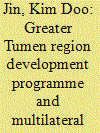| Srl | Item |
| 1 |
ID:
147340


|
|
|
|
|
| Summary/Abstract |
The Chinese town of Hunchun has been at the heart of Northeast Asian cooperation and development plans since the early 1990s, but in a region where maritime connections are essential, Hunchun lacks direct sea access. I explore how the sea has remained a powerful animating force behind Chinese visions for Hunchun's future. After providing an ethnographic account of the contemporary place of the sea in local discourses of Hunchun's identity, I draw on archival material to analyze the politico-linguistic history of maritime affairs in this part of China and beyond. I examine how the notion yang (ocean/foreign) transformed from being a label of foreign interventions in China to serving as a metaphor for domestic economic progress. The sea is both a distant dream and a source of concrete developmental potential for Hunchun today. It is also an optic through which to observe the town's future.
|
|
|
|
|
|
|
|
|
|
|
|
|
|
|
|
| 2 |
ID:
134076


|
|
|
|
|
| Publication |
2014.
|
| Summary/Abstract |
The Tumen River area is considered to be strongly affected by geopolitics, and the GTI programme still has a very long way to go before it can be declared a success story. This article argues that political factors may have a steadily increasing effect on the GTI as part of a geoeconomic micro-regionalist framework. Indeed, political rivalries among the participants often appear more salient than regional
ones. Moreover, an economic explanation for China's involvement in the TRADP is to some extent feasible, but not significantly persuasive. Furthermore, North Korea has tended to be increasingly wary of Chinese investment. Due to the strong South Korean connection with Yanbian, a great concern about rising Korean nationalism has also arisen in the Chinese government. Russia, for its part, may be committed to the project primarily due to its separatist-minded Russian Far East. Japan, however, is not geographically connected by land to the region, but in order to generate positive spill-over effects that include the Japanese economy, the GTI is in need of expanding its geographical coverage to also include the sea area of the East Sea (of the ROK). In the long term, the TRADP need not adhere to the GTI's previous formula of multilateralism. According to policy options, bilateral or trilateral frameworks are preferable.
|
|
|
|
|
|
|
|
|
|
|
|
|
|
|
|
| 3 |
ID:
092201


|
|
|
|
|
| Publication |
2009.
|
| Summary/Abstract |
The success of coastal China in mobilizing resources from the overseas Chinese community has been well documented, and is deemed to have played an important role in the expansion of the Chinese economy. This article adopts a new approach by looking at the issue from the point of view of an ethnic minority border region. It explores the mobilization of the Korean minority's transnational ties in the service of local economic development in the Yanbian Korean Autonomous Prefecture, located in Jilin Province at the North Korean border. These pursuits are conceptualized as "transnationalism from above," whereby the local government focused on mobilizing, institutionalizing, steering and controlling transnational activities in support of its own specific goals. How were these linkages built up and how did the government balance between the positive and negative, or the "sweet and sour" aspects of transnational ethnic capital transfers? The study points to a new mechanism for economic development that is emerging along China's borders.
|
|
|
|
|
|
|
|
|
|
|
|
|
|
|
|